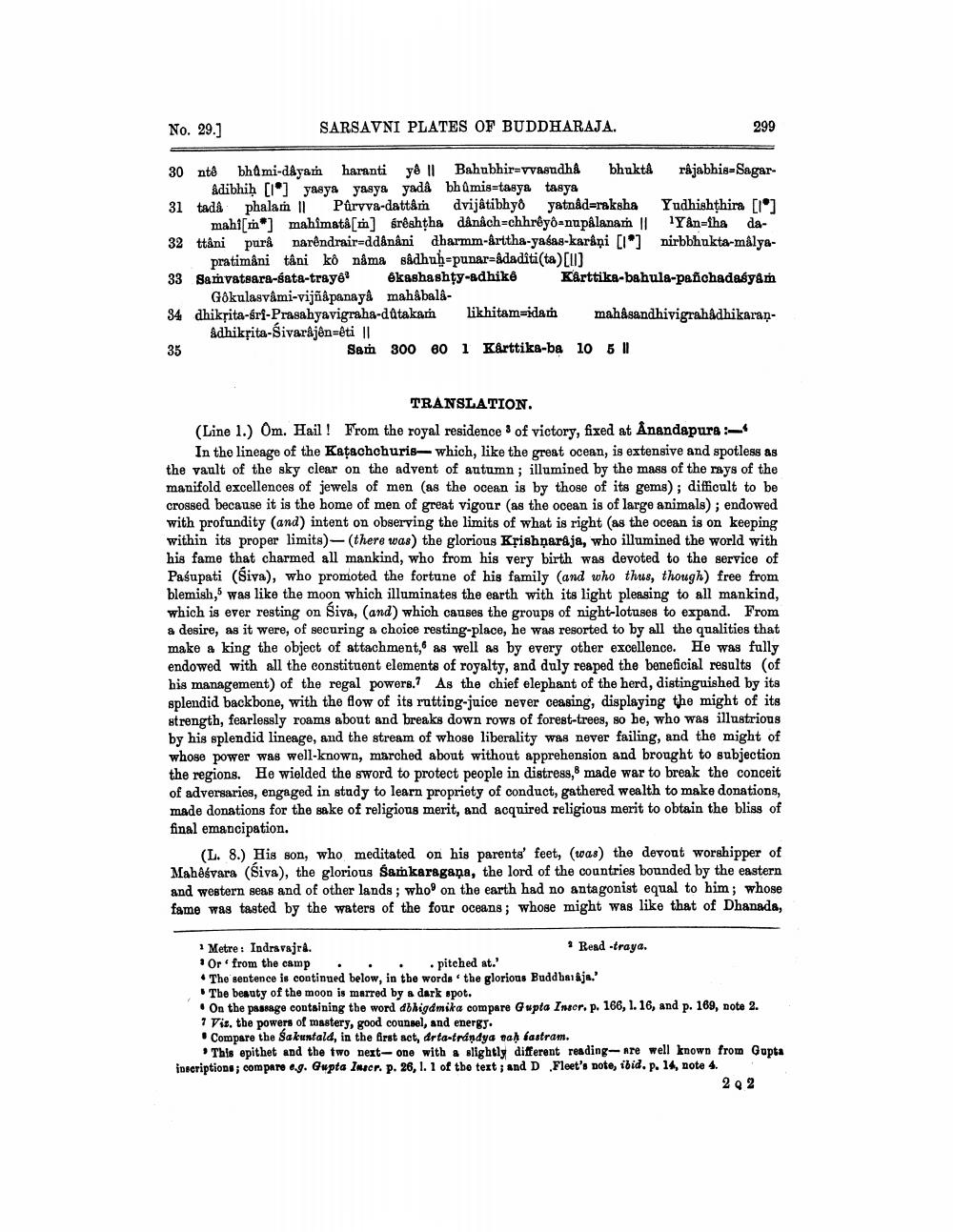________________
No. 29.]
SARSAVNI PLATES OF BUDDHARAJA.
299
30 nt# bhmi-d yarn haranti ye II Bahubhir=vvasudh bhukta rajabhis-Sagar
Adibhiḥ [lo] yasya yasya yada bhQmistasya tasya 31 tada phalam 11 Púryva-dattár dvijâtibhyo yatnád=raksha Yudhishthira [1]
mahi[m] mahimatâ [m] śrêshtha dånách=chhreyðanupålanam || Yan-iha da32 ttäni para darồndrair=dd&nâni dharmm-arttha-yasas-karani [1] nirbbhukta-målya
pratimâni tâni kô nima sådhuh-punar=&daditi(ta)[] 33 Samvatsara-sata-traye! @kashashty-adhike Karttika-bahula-pasohadasyam
Gokulasvâmi-vijñâpanaya mahabald34 dhikrita-fri-Prasahyavigraha-datakam likhitam=idan mahasandhivigrahadhikaran.
adhikrita-Sivarajên=êti II 35
Sam 300 60 i Karttika-ba 10 5 II
TRANSLATION. (Line 1.) Om. Hail! From the royal residence of victory, fixed at Anandapura -
In the lineage of the Katachchuris- which, like the great ocean, is extensive and spotless as the vault of the sky clear on the advent of autumn ; illumined by the mass of the rays of the manifold excellences of jewels of men (as the ocean is by those of its gems); difficult to be crossed because it is the home of men of great vigour (as the ocean is of large animals); endowed with profundity (and) intent on observing the limits of what is right as the ocean is on keeping within its proper limits)-(there was) the glorious Kộishnaraja, who illumined the world with his fame that charmed all mankind, who from his very birth was devoted to the service of Pasupati (Siva), who promoted the fortune of his family (and who thus, though) free from blemish, was like the moon which illuminates the earth with its light pleasing to all mankind, which is ever resting on Siva, (and) which causes the groups of night-lotuses to expand. From a desire, as it were, of securing a choice resting-place, he was resorted to by all the qualities that make a king the object of attachment, as well as by every other excellence. He was fully endowed with all the constituent elements of royalty, and duly reaped the beneficial results of his management) of the regal powers. As the chief elephant of the herd, distinguished by its splendid backbone, with the flow of its rutting-juice never ceasing, displaying the might of its strength, fearlessly roams about and breaks down rows of forest-trees, so be, who was illustrious by his splendid lineage, and the stream of whose liberality was never failing, and the might of whose power was well-known, marched about without apprehension and brought to subjection the regions. He wielded the sword to protect people in distress, made war to break the conceit of adversaries, engaged in study to learn propriety of conduct, gathered wealth to make donations, made donations for the sake of religious merit, and acquired religious merit to obtain the bliss of final emancipation.
(L. 8.) His son, who meditated on his parents' feet, (was) the devout worshipper of Mahêsvara (Siva), the glorious Samkaragana, the lord of the countries bounded by the eastern and western seas and of other lands; who on the earth had no antagonist equal to him; whose fame was tasted by the waters of the four oceans; whose might was like that of Dhanada,
1 Metre: Indravajra.
Read -traya. • Or from the camp . . . . pitched at.' • The sentence is continued below, in the words the glorious Buddhaja.'
The beauty of the moon is marred by a dark spot. . On the passage containing the word dbhigamika compare Gupta Inor. p. 166, 1. 16, and p. 109, note 2. 7 Vis, the powers of mastery, good counsel, and energy.
Compare the Sakuntald, in the first act, drta-trándya dah fastram.
• This epithet and the two next--one with a slightly different reading- are well known from Gupta inscriptions, compare e.g. Gupta Inger. p. 26, 1. 1 of the text; and D Fleet's note, ibid. p. 14, note 4
292




